-
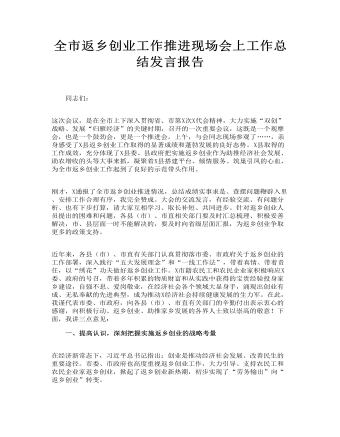
全市返乡创业工作推进现场会上工作总结发言报告
近年来,各县(市)、市直有关部门认真贯彻落市委、市政府关于返乡创业的工作部署,深入践行“五大发展理念”和“一线工作法”,带着真情、带着责任,以“绣花”功夫做好返乡创业工作。X市籍农民工和农民企业家积极响应X委、政府的号召,带着多年积累的物质财富和从实践中获得的宝贵经验投身家乡建设,自强不息、爱岗敬业,在经济社会各个领域大显身手,涌现出创业有成、无私奉献的先进典型,成为推动X经济社会持续健康发展的生力军。在此,我谨代表市委、市政府,向各县(市)、市直有关部门的辛勤付出表示衷心的感谢,向积极行动、返乡创业、助推家乡发展的各界人士致以崇高的敬意!
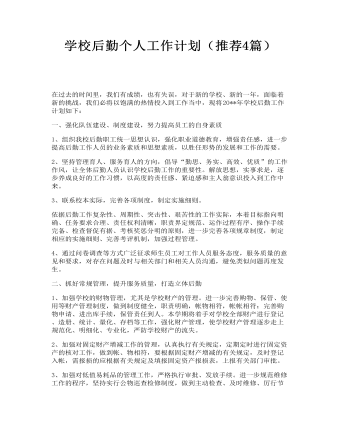
学校后勤个人工作计划(推荐4篇)
1、组织我校后勤职工统一思想认识,强化职业道德教育,增强责任感,进一步提高后勤工作人员的业务素质和思想素质,以胜任形势的发展和工作的需要。2、坚持管理育人、服务育人的方向,倡导“勤思、务实、高效、优质”的工作作风,让全体后勤人员认识学校后勤工作的重要性。解放思想,实事求是,逐步养成良好的工作习惯,以高度的责任感、紧迫感和主人翁意识投入到工作中来。3、联系校本实际,完善各项制度,制定实施细则。

人教版新目标初中英语七年级上册Do you want to go to a movie教案
讨论喜欢的影视类型及理由:在看过一部影视作品后,大家总是喜欢在一起谈论影视的主要内容、主要情节、主要演员主题歌曲、主题音乐等,互相介绍自己对该影视的看法。教师可以组织一次活动,分组讨论学生喜欢看什么类型的电影,并说明喜欢的理由。运用I like…I don’t like…Because it is…等语言结构;然后每个组选派一名代表向全班学生阐述本组组员喜欢观看的电影类型;最后汇总,总结出全班同学最喜欢观看哪一种类型的电影。如果有可能,根据学生的选择放一部(一段)这种类型的影视节目。通过学生的讨论、调查,使他们在完成任务的过程中学会询问和陈述自己或别人在影视方面的喜好及理由,更好地巩固所学内容。Self Check教学内容Self Check(教材P58)教学目标知识与能力复习词汇go,movie,action,comedy,documentary,thriller,and,but,scary,funny, sad,exciting;引导学生复习、巩固“制订计划和打算并谈论喜好和偏爱”的目标语言。

人教版新目标初中英语七年级上册What time do you go to school教案
知识与能力复习词汇time,morning,breakfast,get up,g0 t0 bed,homework,clock,afternoon,lunch,run,watch TV,evening,dinner,eat,usually,o’clock,thirty,fifteen,take a shower,go t0 school等;引导学生复习、巩固“询问和谈论时间”的目标语言并运用所学知识安排自己的学习和课外活动。过程与方法运用Summarizing,Classifying和Comparing的学习策略。在复习教学中,运用听写、提问、对话演练与调查活动,促使学生不断地使用所学内容,从而提高他们灵活运用知识的能力。情感态度价值观本部分的主要内容是复习“日常作息时间”的询问和表达。通过互相询问或谈论自己或对方的作息时间安排和活动计划,培养学生良好的作息习惯和守时习惯。教学重、难点及教学突破重点复习词汇time,morning,breakfast,get up,g0 to bed,homework,clock,afternoon,lunch,run,watch TV,evening,dinner,eat,usually,o’clock,thirty,fifteen,take a shower,go to school等;引导学生复习、巩固“询问和谈论时间”的目标语言。
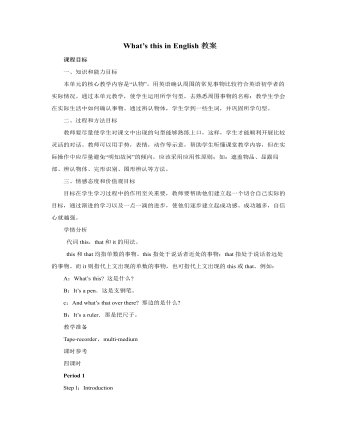
人教版新目标初中英语七年级上册What’s this in English教案
一、知识和能力目标本单元的核心教学内容是“认物”。用英语确认周围的常见事物比较符合英语初学者的实际情况。通过本单元教学,使学生运用所学句型,去熟悉周围事物的名称;教学生学会在实际生活中如何确认事物。通过辨认物体,学生学到一些生词,并巩固所学句型。二、过程和方法目标教师要尽量使学生对课文中出现的句型能够熟练上口,这样,学生才能顺利开展比较灵活的对话。教师可以用手势,表情,动作等示意,帮助学生听懂课堂教学内容,但在实际操作中应尽量避免“明知故问”的倾向,应该采用应用性原则;如:遮盖物品、显露局部、辨认物体、完形识别、图形辨认等方法。三、情感态度和价值观目标目标在学生学习过程中的作用至关重要,教师要帮助他们建立起一个切合自己实际的目标,通过渐进的学习以及一点一滴的进步,使他们逐步建立起成功感。成功越多,自信心就越强。
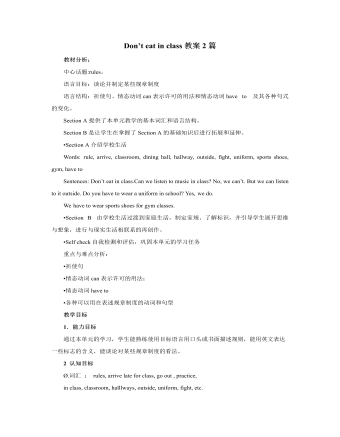
人教版新目标初中英语七年级下册Don’t eat in class教案2篇
Don’t fight. =You can’t fight. (板书,教读)教师把这些句子板书在黑板上,并请学生大声整齐地读祈使句和“can’t”句型,并让学生注意两种句型表达形式的不同和转换,“Don’t …=You can’t…”;并对学生说:These are our school rules. (板书,教读) You can’t break the school rules. Don’t break the school rules.(板书,教读)步骤3 :Practicea. T: Now, each of the students is breaking one of these rules.Please finish 1a.学生看图,完成1a的内容,检查答案并大声朗读校规。b. 听录音,完成1b,选出四位学生都违反了哪条校规;听之前,学生要读会英文名。c. 请两位学生朗读1c部分的句型;要求学生两人一组对话表演,SA扮演外校转来新生,SB告知本校校规。(学生可经过讨论,多说出他们想到的校规,不必只限于书上;教师应给予帮助)2) 第二课时(2a~4)步骤1 :warming up of revisionT: What are the rules at your school?学生使用“can”或祈使句表达各条校规;其中老师可引出“eat in the cafeteria outside”的表达。步骤2 :Practicea.T: Christina is an exchange student. She doesn’t know the rules. Let’s listen, what activities they’re talking about?学生听第一遍时,完成2a;第二遍时,完成2b;b. 请学生领读2c部分,看着2a完成的表格,理解2c活动的要求;分成小组针对2a进行问答;
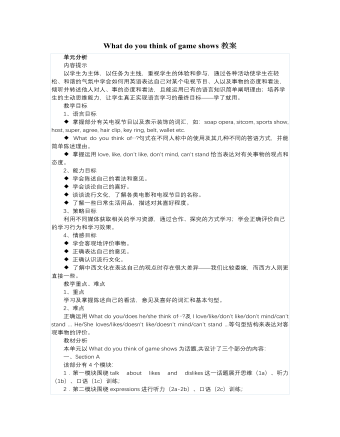
人教版新目标初中英语七年级下册What do you think of game shows教案
五、教学Section B-2c1. Pair work: What do you think of the belt/sunglasses/…? What does your father/mother/… think of your scarf/belt…?2. Group work(1). Teacher shows some different kinds of school uniforms (制服)and asks : “ What do you think of your school uniforms? If you have a chance to choose your school uniforms, what kind would you like to choose?”(2). Discuss in groups.(3).Get some Ss to report in class.说明:这一步旨在让学生运用已有的语言知识谈论对事物的看法和意见,并简单阐明理由,培养学生的主动思维能力和运用英语的能力。六、教学拓展调查电视节目的收视率任务:调查你周围的人对现在各种电视节目的反响。活动过程:1.教师布置任务,让学生调查周围的人(包括他的亲戚朋友和邻居)喜欢收看哪方面的电视节目。2.学生进行调查活动,运用本单元所学的句型What do you think of….? (Why?)What's your favorite game shows?What do you think of talk show?I doesn’t mind it.I like it.I love it.I can’t stand it.3.记录下排在前10位的TV Program,填写调查表,比较其收视率。

人教版新目标初中英语八年级上册How do you get to school教案2篇
Step Ⅶ Role play ( Work on 1b)1. First ask two students to read the dialogue to the class.Sa: How do you get to school?Sb: Well, I ride my bike to the subway station. Then I take the subway.2. Now work with a partner.Suppose you use two kinds of transportation to get to school \Hangzhou\Beijing... (bus, train, subway, walking, bike, etc.) Tell how you get there. You may use the phrases in 1a.3. Then ask different pairs of students to present their conversations to the class.Step ⅧListening1. Work on 2a(1) First ask students to read the list of information that Thomas wants to know.…where Nina lives.…how far from school she lives.…how long it takes to get to school.…how she gets to school.…what she thinks of the transportation.(2) Tell students what transportation and bus stop mean.bus stop 汽车站 transportation n. 运送;运输Then tell students we'll hear a recording. Please put a checkmark in front of each thing that Thomas wants to know.(3) Now play the recording for students.( Have students pay attention to the sample answer.) (4) Then correct the answers.

人教版新目标初中英语八年级上册What are you doing for vacation教案2篇
Teaching goals : 1. Words & phrases: babysit ,get back , fishing , rent , think about , decide(on) , tourist etc. 2. How to talk about future plans . 3. 现在进行时表示将来计划或行动. 4. 特殊疑问句(where , when , how long引导) Important and difficult points : Drills :What are you doing for vacation ? I’m watching TV . When are you going ? I’m going … . How long are you staying ? We’re staying for five days . Teaching aids : cards and a tape ,a large wall calendar . Period 1 Teaching procedures : Step 1Leading in1. Free talk . 2. Put up the wall calendar . T: I’m staying home on Saturday (pointing to next Saturday ).Ss repeat . Ss: I’m staying home on Saturday . T: OK. Today we’ll learn how to talk about future plans. Step 2Pre-task SB Page 13 , 1a . 1. Look at the picture carefully and tell what you see in the picture . 2. Write the activities from the pictures in the box and add some more . 3. Practice reading . Step 3While-task1. Using the activities we write in 1a to make conversations .For example :What are you doing for vacation ? I’m visiting my uncle . 2. Pairwork .Practice in pairs . 3. 用第三人称练习对话.
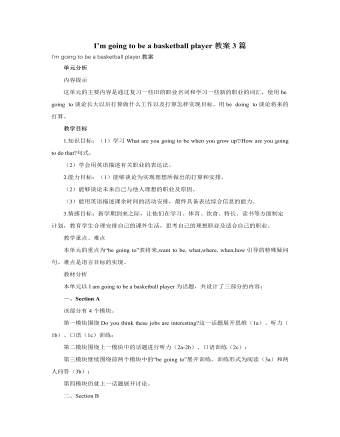
人教版新目标初中英语八年级上册I’m going to be a basketball player教案3篇
教学目标1.知识目标:(1)学习What are you going to be when you grow up?/How are you going to do that?句式。(2)学会用英语描述有关职业的表达法。2.能力目标:(1)能够谈论为实现理想所做出的打算和安排。(2)能够谈论未来自己与他人理想的职业及原因。(3)能用英语描述课余时间的活动安排,最终具备表达综合信息的能力。3.情感目标:新学期到来之际,让他们在学习、体育、饮食、特长、读书等方面制定计划,教育学生合理安排自己的课外生活,思考自己的理想职业及适合自己的职业。教学重点、难点本单元的重点为“be going to”表将来,want to be, what,where, when,how引导的特殊疑问句。难点是语言目标的实现。教材分析本单元以I am going to be a basketball player为话题,共设计了三部分的内容:一、Section A该部分有4个模块。第一模块围绕Do you think these jobs are interesting?这一话题展开思维(1a)、听力(1b)、口语(1c)训练;
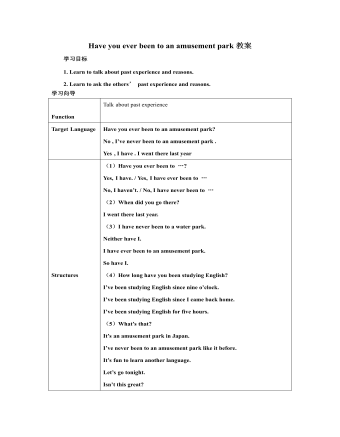
人教版新目标初中英语八年级下册Have you ever been to an amusement park教案
(1)Have you ever been to …? Yes, I have. / Yes, I have ever been to …No, I haven’t. / No, I have never been to …(2)When did you go there? I went there last year. (3)I have never been to a water park. Neither have I. I have ever been to an amusement park. So have I. (4)How long have you been studying English? I’ve been studying English since nine o’clock. I’ve been studying English since I came back home. I’ve been studying English for five hours. (5)What’s that? It’s an amusement park in Japan. I’ve never been to an amusement park like it before. It’s fun to learn another language. Let’s go tonight. Isn’t this great?space museum, amusement park, water park, South America, Peru, Holland, European culture, tour guide, flight attendant, musical instrument, more than, be from, get to, take lessons, neither, discover, graduate, change
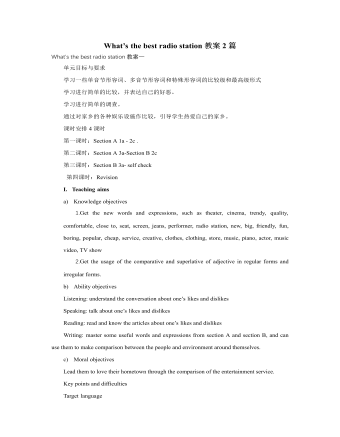
人教版新目标初中英语八年级上册What’s the best radio station教案2篇
教学重点和难点:运用所掌握的语言描述,比较不同地点的特点。在练习中学习掌握英语比较级和最高级的用法。课前准备分配小组,每组五至六人。通过上网或翻阅报刊杂志等方法,确定旅游线路,做出基本的旅游计划。教学设计:本节课流程图 学法指导:1.由于这是一堂新课,在教学中应注意面向全体,发挥学生的主体性,引导学生积极参与,激发学生的求知欲和学习积极性,指导学生积极思维,主动获取知识,养成良好的学习方法。逐步学会独立解决问题。总之要尽可能调动学生的非智力因素促进智力因素的发展。教法选择:1.电化教学法2.课堂讨论法3.任务型教学法采用这些方法的目的是为了充分调动学生的学习积极性,使学生变被动学习为主动学习。通过电脑形象的演示,加强印象,提高兴趣,突破难点,提高教学效率,进而增大教学的容量和信息量。充分体现教师为主导,学生为主体的教学原则。
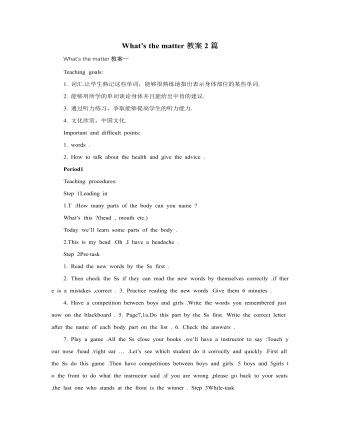
人教版新目标初中英语八年级上册What’s the matter教案2篇
She shouldn’t go to the party tonight.Step7. TaskT: You know, there are lots of problems in our life. If you are a doctor, please tell us how to solve the problem. I will divide you into 9 groups. Please work in groups. And then choose one of you to report your ideas.The following are the problems:I have a toothache.I am hungry. I have a sore throat.I am stressed out. I have a sore back.I am tired. I can’t sleep.I have a cold. I have a headache.Report: If you have a headache, you should go to bed early. You should see the doctor. You should eat some medicine. You shouldn’t wash your face with cold water.You shouldn’t sleep late.You shouldn’t swim.…..T encourages the students to give advice as much as possible.Homework:1. Chose one of the problems, and write down your advice2. Copy the new words这一步是用于热身的,同时也可以让他们复习一部分的表示人体部位的单词,扩充知识.学习语言的过程也是一个不断积累的过程,复习旧知识,增添新知识.通过小游戏,强化学生对Does she/he have…这个句子的运用能力.通过复习,自然的引到下面新知识的学习。充分利用表格,由句子到对话,再到文章,让学生循序渐进. 提高学生的综合语言运用能力,运用以前学过的知识来解决身边的问题.Period 5 (Section B 3a—3c, selfcheck)教学内容与分析:

人教版新目标初中英语九年级上册Teenagers should be allowed to choose their own clothes教案2篇
Step 1 Greeting Greet the class and check the homeworkStep 2 A duty report The S on duty gives a report on the rules in his home and lead in 3a “Sun Fei’s and Wu Yu’s rules” Step 3 ReadingSs read the conversation and write the two girls’ rules in the chart. Check the answers.Get Ss to read after the tape and then read aloud by themselves. Then, T explains the language points.Step 4 Pairwork 3bRole play. Use the information in chart to practice with the conversation in 3a covered. They can look at the sample conversation in the right box.Step 5 Task 2 “Who’s the best reporter?”Make a survey by asking any 5 students the questions in the chart in activity 4. Then give out a report about it. See who is the best reporter? And the best reporter will get a nice ball-pen.Step 6 Summary and homework:Write out the report in your exercise-books.Period ThreeStep 1 Greeting and a duty reportThe S gives a duty report talking about his experience of being late for school. Lead in the question “Do you ever get to school late? How often do you get to school late? Always, usually, sometimes, or never?Step 2 1a Get Ss to finish writing.Step 3 Pairwork 1b Get Ss to talk about their answers with their partners using the sample conversation in the box on the right.Step 4 Listening practice2a Lead-in: What will happen if you get to school late? What about Peter? Let’s listen to a conversation between Peter and his father. Get Ss to finish 2a (As usual, for the first time, Ss only listen.) Check the answers.
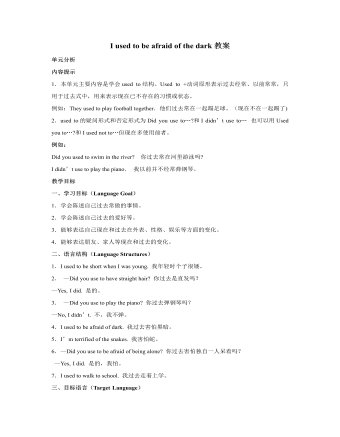
人教版新目标初中英语九年级上册I used to be afraid of the dark教案
内容提示1.本单元主要内容是学会used to结构。Used to +动词原形表示过去经常、以前常常,只用于过去式中,用来表示现在已不存在的习惯或状态。例如:They used to play football together.他们过去常在一起蹋足球。(现在不在一起踢了)2.used to的疑问形式和否定形式为Did you use to…?和I didn’t use to… 也可以用Used you to…?和I used not to…但现在多使用前者。例如:Did you used to swim in the river? 你过去常在河里游泳吗?I didn’t use to play the piano. 我以前并不经常弹钢琴。教学目标一、学习目标(Language Goal) 1.学会陈述自己过去常做的事情。2.学会陈述自己过去的爱好等。3.能够表达自己现在和过去在外表、性格、娱乐等方面的变化。4.能够表达朋友、家人等现在和过去的变化。二、语言结构(Language Structures) 1.I used to be short when I was young. 我年轻时个子很矮。 2. —Did you use to have straight hair? 你过去是直发吗?—Yes, I did. 是的。 3. —Did you use to play the piano? 你过去弹钢琴吗?—No, I didn’t. 不,我不弹。 4.I used to be afraid of dark. 我过去害怕黑暗。 5.I’m terrified of the snakes. 我害怕蛇。
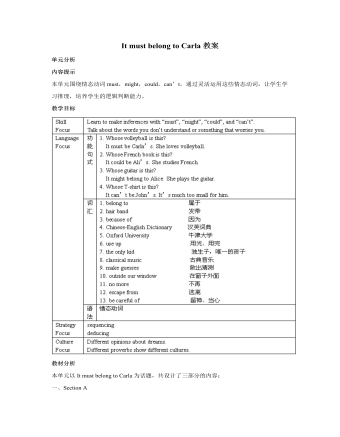
人教版新目标初中英语九年级上册It must belong to Carla教案
一、Section A该部分有4个模块。第一模块围绕Whose volleyball is this? 这一话题展开思维( 1a)、听力(1b)、口语( 1c)训练;第二模块围绕上一模块中的话题进行听力( 2a-2b)、口语训练( 2c);第三模块继续围绕前两个模块中的“making inferences”展开训练。训练形式为阅读排序( 3a)和两人问答(3b);第四模块仍就上一话题展开讨论。二、Section B该部分有4个模块。第一模块要求根据图画和所提供的单词写出合理的句子;第二模块在听力( 2a-2b)和分角色口语训练( 2c)的基础上,继续进行“推测”训练; 第三模块围绕“Strange events in Bell Tower neighborhood”这一话题展开阅读( 3a)和写作(3b -3c)训练;第四模块以dream为话题展开小组活动。三、Self Check该部分有3个模块。第一模块以填空形式对所学词汇进行训练;第二模块就8个谚语展开阅读和讨论。

人教版新目标初中英语九年级下册Rainy days make me sad教案
1. 教材分析本单元以how do things affect you?为话题, 从颜色、天气、音乐、广告、产品等方面谈论了外界事物如何影响人的心情。要求学生掌握表达某物或某事给人带来的感觉、看法或影响等。共设计了四个部分的内容:Section A 该部分有4个模块:第一模块围绕Which restaurant would you like to go to?这一话题展开思维(1a)、听力(1b)、口语(1c)训练;第二模块围绕How does music affect you? 进行听力(2a-2b)、口语训练(2c);第三模块继续围绕how do colors in the restaurant affect you这一话题展开训练,训练形式为阅读和问题体验(3a)和小组活动(3b);第四模块仍就How do things affect you这一话题以调查的形式展开讨论。Section B该部分有4个模块:第一模块围绕产品广告对人们的影响这一话题以“配对”(1a)与“列举”(1b)两种形式展开训练;第二模块继续围绕How do things affect you? 进行听力(2a-2b)、口语对话训练(2c);第三模块围绕“Advertising”这一话题展开阅读(3a-3b)和写作(3c)训练;第四模块围绕How posters affect you这一话题以口语训练形式展开小组活动。

人教版新目标初中英语九年级下册I’ll help clean up the city parks教案
Talk about offering help (P60)I’ll help clean up the city parks.A: I’d like to work ...B: You could help ...Talk about ways to tell people about the Clean-Up Day (P61)We need to ...We can’t ...I’ll ...Talk about the work the volunteers do (P62)These three students all volunteer their time to help other people.Somebody loves to ... / helps ... / plans to ... / wants to ...A: What do you like doing?B: I like ... A: What kind of volunteer work do you think I could do?B: You could ...1. 重点词汇advertisement, fix, repair, pleasure, blind, deaf, shut, carry, specially, fetch2. 认读词汇hunger, homeless, cheer, clean-up, sign, establish, major, commitment, elementary, veterinarian, coach, similar, call-in, strategy, disabled, organization, unable, support, appreciate, donation, part of speech, pronoun, adverb, preposition, conjunction, donate, Jimmy, Sally3. 词组clean up, cheer up, give out, put off, set up, think up, take after, fix up, give away, put up, hand out, work out, at once

人教版新目标初中英语九年级下册You’re supposed to shake hands教案
教学目标:1. 掌握本单元一些重点词汇的写法和用法。2. 学会自如谈论餐桌礼仪。Step 1 RevisionAsk some students to retell the customs at the table in France in the passage in 3a.Step 2 Self checkPart 1. Fill in each bland with the correct word given. Students do the exercises by themselves at first. Then check the answers. Ask the students to comprehend the sentences and help them point out uses of some words, like “arrive (at / in) sw., spend time / money on sth , spend time / money (in) doing sth.”Part 2. Read about Fan Ling’s experience in a western restaurant. Understand the passage. Point out some key points in the passage.1. be / get used to doing sth. 习惯做某事2. begin with = start with 以….开头3. crowd v. 挤满,塞满 the crowd 人群 crowded adj. 拥挤的Then students discuss about how she would solve her problem. Ask some to share their stories with others.Part 3. Complete the crossword by looking at the sentences on the left. Then check the answers.
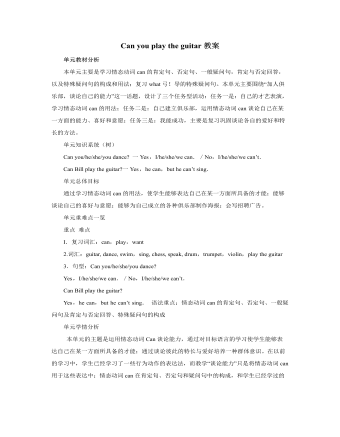
人教版新目标初中英语七年级上册Can you play the guitar教案
本单元主要是学习情态动词can的肯定句、否定句、一般疑问句,肯定与否定回答,以及特殊疑问句的构成和用法;复习what弓!导的特殊疑问句。本单元主要围绕“加人俱乐部,谈论自己的能力”这一话题,设计了三个任务型活动:任务一是:自己的才艺表演,学习情态动词can的用法;任务二是:自己建立俱乐部,运用情态动词can谈论自己在某一方面的能力、喜好和意愿;任务三是:我能成功,主要是复习巩固谈论各自的爱好和特长的方法。单元知识系统(树)Can you/he/she/you dance? 一Yes,I/he/she/we can./No,I/he/she/we can’t.Can Bill play the guitar?一Yes,he can,but he can’t sing.单元总体目标通过学习情态动词can的用法,使学生能够表达自己在某一方面所具备的才能;能够谈论自己的喜好与意愿;能够为自己成立的各种俱乐部制作海报;会写招聘广告。单元重难点一览重点 难点I.复习词汇:can,play,want2.词汇:guitar, dance, swim,sing, chess, speak, drum,trumpet,violin,play the guitar3.句型:Can you/he/she/you dance?Yes,I/he/she/we can./No,I/he/she/we can’t.Can Bill play the guitar?

